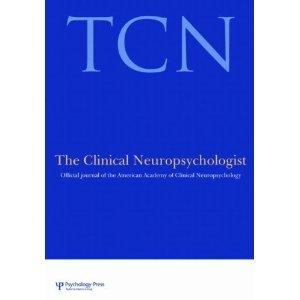Artigo Científico – Dislexia e Funcionamento Executivo
 Foi recentemente publicado um estudo intitulado “Executive Functioning in Children with Developmental Dyslexia” sobre o funcionamento executivo de crianças disléxicas portugueses na revista científica The Clinical Neuropsychologist, que é uma das revistas mais prestigiadas na área da neuropsicologia, pertencente à Academia Norte-Americana de Neuropsicologia Clínica (The American Academy of Clinical Neuropsychology).
Foi recentemente publicado um estudo intitulado “Executive Functioning in Children with Developmental Dyslexia” sobre o funcionamento executivo de crianças disléxicas portugueses na revista científica The Clinical Neuropsychologist, que é uma das revistas mais prestigiadas na área da neuropsicologia, pertencente à Academia Norte-Americana de Neuropsicologia Clínica (The American Academy of Clinical Neuropsychology).
Os autores deste estudo nacional foram Octávio Moura (responsável pelo Portal da Dislexia), Mário R. Simões e Marcelino Pereira. Esta equipa do grupo de investigação em Neuroscience, Neuropsychology and Cognitive Assessment da Faculdade de Psicologia e de Ciências da Educação da Universidade de Coimbra já são autores de outras publicações internacionais na área da Dislexia, nomeadamente:
- Developmental Dyslexia and Phonological Processing in European Portuguese Orthography — Revista “Dyslexia” (2015)
- Working Memory in Portuguese Children With Developmental Dyslexia — Revista “Applied Neuropsychology: Child” (2014)
- WISC-III Cognitive Profiles in Children with Developmental Dyslexia: Specific Cognitive Disability and Diagnostic Utility — Revista “Dyslexia” (2014)
Os resultados do estudo agora publicado (Aceder à Página do Artigo/Abstract) demonstram o comprometimento de algumas funções executivas (flexibilidade, velocidade de processamento e fluência verbal fonémica e semântica) em crianças disléxicas nacionais, similar ao observado em estudos com amostras internacionais. A flexibilidade foi a única função executiva preditora do diagnóstico de Dislexia, com uma moderada capacidade na discriminação das crianças com Dislexia das crianças leitoras normais. O estudo salienta, ainda, que apesar das alterações no funcionamento executivo estarem presentes nas crianças com Dislexia, a sua avaliação não é suficiente para o estabelecimento de um diagnóstico clínico desta perturbação neurodesenvolvimental.
Abstract
The term “executive function” has been used to describe several higher-order cognitive processes. This study examined the processing speed, shifting, planning, and verbal fluency of a sample of 50 Portuguese children with developmental dyslexia (DD) and 50 typically developing children (TDC; chronological-age-matched controls) between 8 and 12 years of age to evaluate the children’s executive functioning. Compared to TDC, children with DD revealed significant processing speed, shifting, and verbal fluency deficits. After controlling for differences in the general intellectual ability, significant group differences remained for shifting, verbal fluency and marginally for processing speed. No significant differences in planning ability were observed between the groups. No significant interaction of group, gender, and age was found for any of the executive functions measures studied. Word productivity in both semantic and phonemic verbal fluency tasks decreased significantly over the 60 seconds for both groups. Shifting was the only significant predictor of DD in the binary logistic regression analysis and yielded the highest area under the curve value (receiver operating characteristics curve analysis). Therefore, although these findings highlight the presence of specific executive functions deficits in children with DD, they should not be interpreted as indicative of the presence or absence of this learning disorder.
Referência Blibliográfica:
Moura, O., Simões, M. R., & Pereira, M. (2014). Executive Functioning in Children with Developmental Dyslexia. The Clinical Neuropsychologist. doi: 10.1080/13854046.2014.964326 (Aceder à Página do Artigo/Abstract)
Acesso ao Artigo
Caso tenha interesse e pretenda ter acesso integral ao artigo, entre em contacto com o autor solicitando o acesso ao mesmo.
